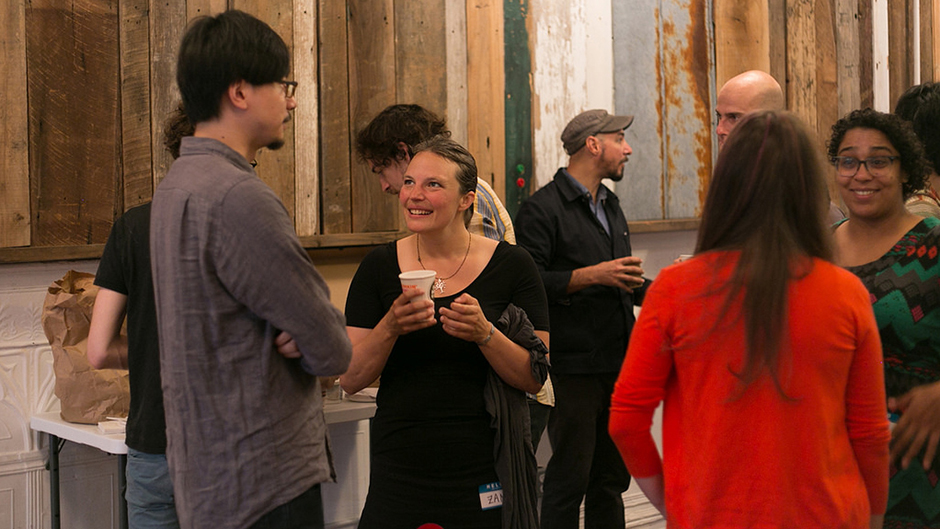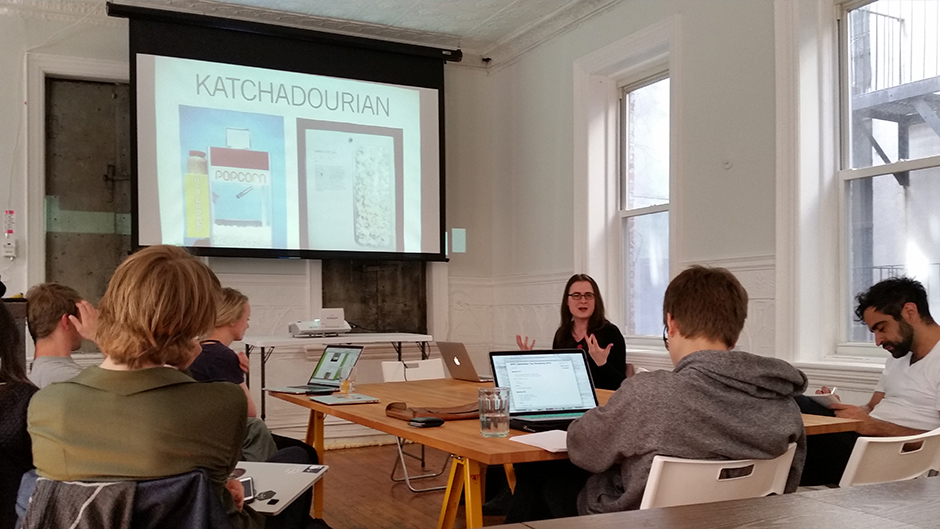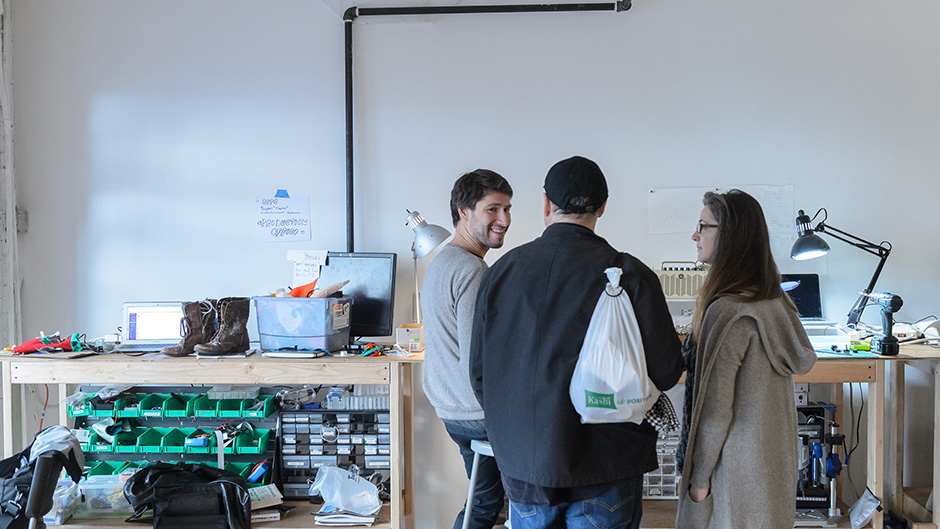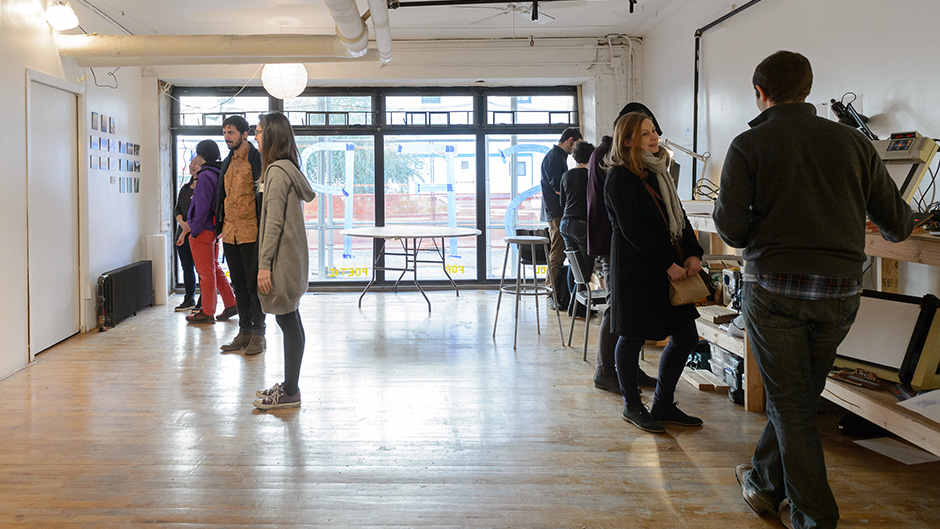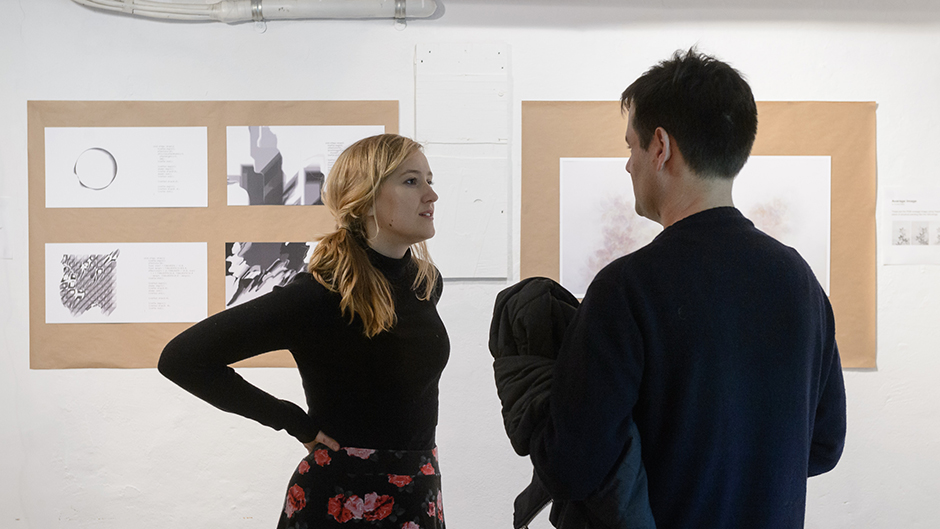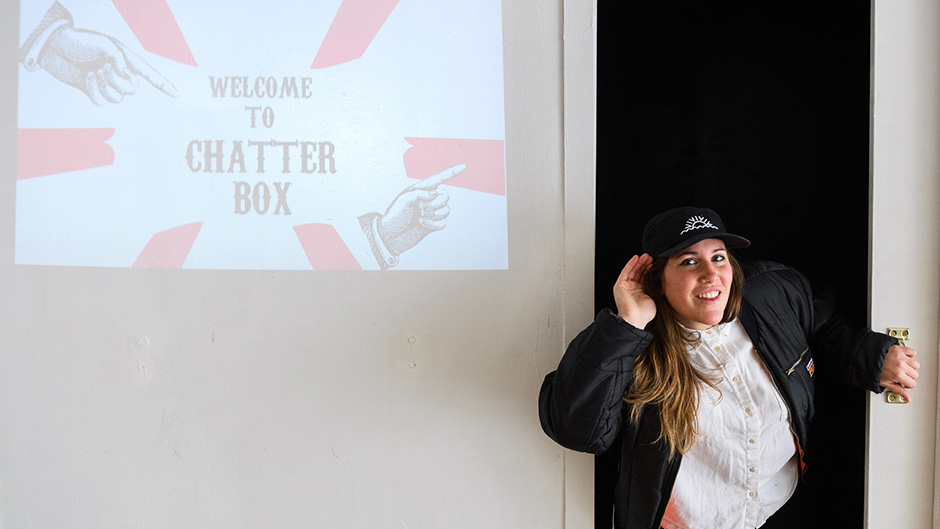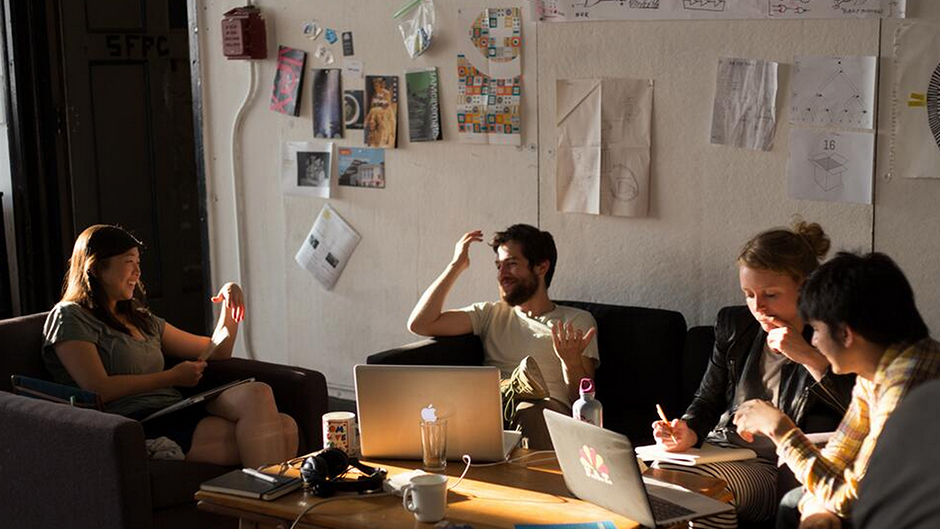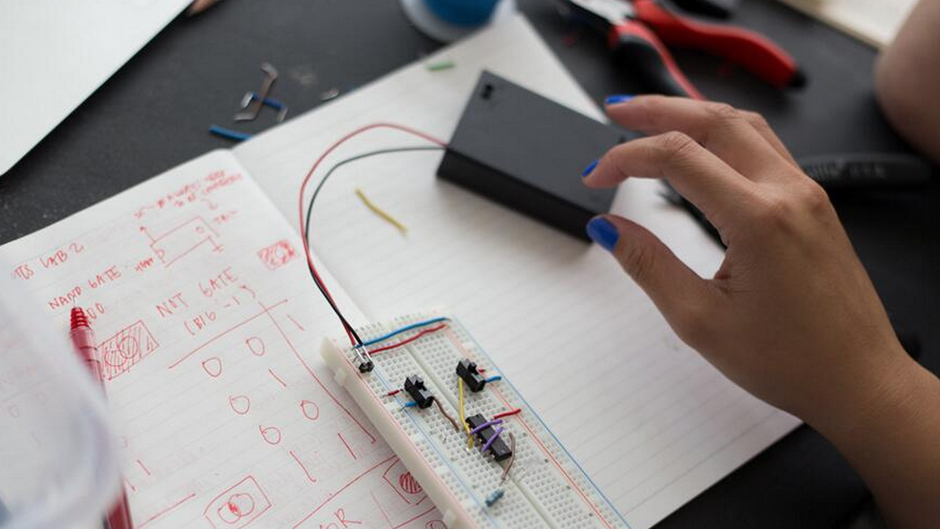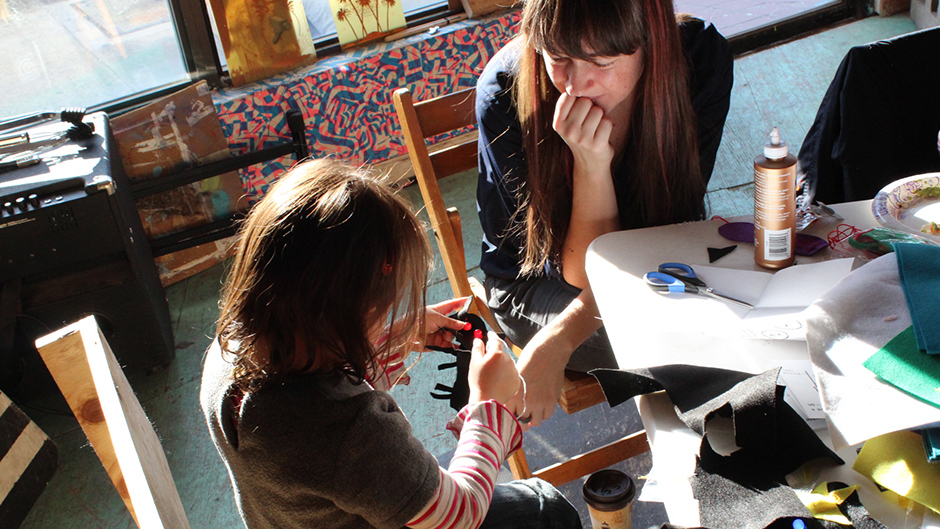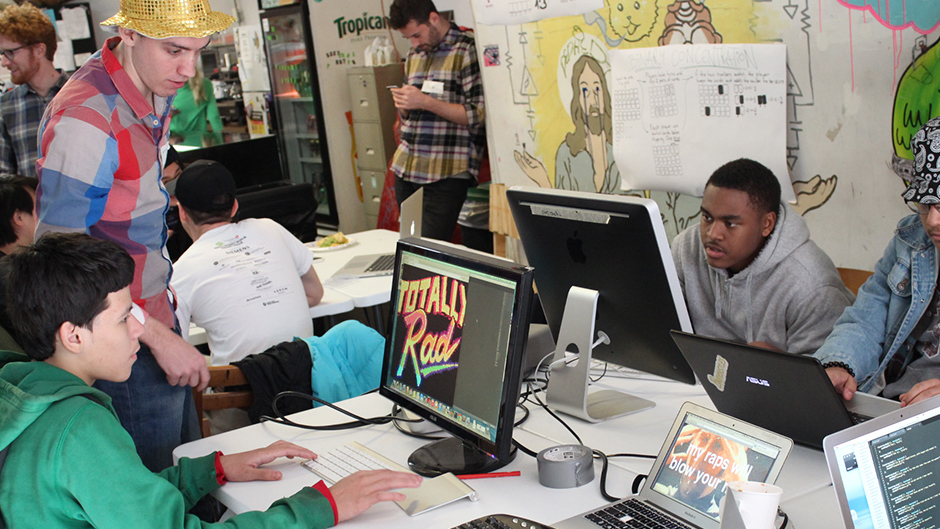Fall 2018 Immersive
- Ten-Week Session: September 10th – November 16th, 2018
- Location: SFPC, 155 Bank Street, West Village, NYC
Join SFPC’s main program for ten weeks in New York City. Daily classes range from programming, electronics, poetry and the history and theory of art and technology. Students have full access to the space to work on projects. Teachers and mentors are readily available for technical, conceptual, and artistic guidance. Peer to peer collaboration is highly encouraged among students. Check out weekly reports by a current student.
We will select up to 15 students for the session. Classes are usually held Tuesday-Friday between 10am and 1pm. Students are expected to participate full-time. There are student-led skill sharing sessions, lectures and workshops with visiting artists, field trips to institutions, schools, art spaces and dinners with special guests. We offer an optional Onboarding week at the beginning of the session for students who are new to code or feel like they need additional time to focus on coding before the full session starts.
We kick off the program with SFPC Salon, an evening of talks and performances by leading practitioners in the field. We finish the program by celebrating with a final showcase where students get to share their projects with the larger SFPC community. Final showcase is typically scheulded on the last weekend of the program. Most importantly, SFPC is a safe space for students to grow. Consider joining the community of curious and generous peers through SFPC’s main program.
Apply to the Fall 2018 have closed
What classes will happen during the session?
SFPC classes are typically structured around the following concepts:
- Computation and artistic practice — Algorithmic processes and concepts have been manifest in art and design throughout the twentieth century. How can we explore the influence of algorithms in practice and develop new approaches and techniques for utilizing them? What is the fundamental nature of computation and how can we work with it in a lyrical, expressive manner? How can code make things move in compelling and lifelike ways through animation and interaction? Check out Recreating the Past by Zach Lieberman, the SFPC Re-Coded project and Lux Lingua by Patricio Gonzalez Vivo.
- Language design as creative practice — Every programming language has specific parameters and demands certain processes in its use, we consider the subtle differences and approaches that have shaped various languages throughout history. This area focuses also on ways to design programming languages from scratch and asks how can language design open up new ways of thinking, making and building software? How can we build better tools and with that, better possibilities for ourselves? Check out Radical Computer Science by Ramsey Nasser, Code and Platform and Small Machines by Nick Montfort.
- Electronics and physical computing — What are the fundamental building blocks for electronic computer? How do transistors, resistors and capacitors work? How can we use binary logic gates to create adding and remembering machines? How does CPU work? How have micro-controllers made physical computing more accessible? Check out Handmade Computer by Taeyoon Choi.
- Theory and philosophy for technology — With contemporary society and our collective future irrevocably changed by ubiquitous technology, what critical and ethical questions can we, the makers, artists and technologists pose to society? What can we learn from the history of technology and how can we draft the future we like to see? Check out Poetic Computation: Reader by Taeyoon Choi, The Radical Outside by Morehshin Allahyari, Architectural History of Computing by Ingrid Burrington, Critical Theory of Technology by Allison Burtch.
- Building the commons — The degree of access to artistic computational tools is largely a product of race, gender, sexuality, geography, and class. How can we use our skills and resources to bridge these divides? This area focuses on developing teaching tools, systems, and approaches to help bring poetic computation to diverse communities. Check out Poetic Science Fair at Silent Barn.
- Pedagogy, strategies for learning and teaching — How do you learn new things? What sorts of environments and communities foster a nurturing space and an ongoing practice of learning? Check out Learning to Teach Conference by Tega Brain and Taeyoon Choi.
The idea behind these interconnected topics is to build on SFPC’s core curriculum by exploring common ground where we can take the ideas developed in our classroom into the streets and studio. We see them as platforms to help promote fearless prototyping, asking difficult questions, and creating projects that embody issues that are not yet commonly addressed in the world of art and technology. Check out SFPC Fall 2017 academic repository to view the slides, codes and materials from the classes we offered.
Who are the teachers?
We will announce the list of teachers near the program. Here are some teachers who work with us: Zachary Lieberman, Taeyoon Choi, Lauren Gardner Kelli Anderson, Robby Kraft, Morehshin Allahyari, Allison Parrish, Nick Montfort, Caitlin Morris, Ramsey Nasser, Ingrid Burrington, Pam Liou and more.
SFPC Fall 2018 will be organized by SFPC Team including Lauren Gardner, Taeyoon Choi and Zachary Lieberman. Additional support will be provided by the SFPC Steering Committee, Teaching Fellows and Artist in Residence.
Onboarding Week
We are offering an 1-week intensive for students who are new to coding. We highly suggest the Onboarding Week for students who are not familiar with creative coding toolkit openFrameworks. From September 3rd,to 7th, students will work with the core faculty to learn about the fundamental concepts and terms of computation, tools and environment for development. We recommend the Onboarding Week to beginners as well as students who are returning to coding after a long break. Tuition for Onboarding Week will be $500 for five days of classes, from 11am to 5pm. Check out our blog posting from 2017 Onboarding Week.
What does it feel like?
Video from the first class in 2013.
Video by Fall 2017 student, Yumi Nishida.
Video by Spring 2017 student, Nitcha Fame Tothong.
Deadline to apply
The deadline for the Fall 2018 is extended to June 6, 2018. Applications have now closed.
In the past, we’ve received 60+ strong applications from around the world, and this time will likely be competitive as well. We will select students based on a work sample, application form and a short video introduction. We sometimes reach out to the applicant’s reference for a letter of recommendation.
How competitive is the admissions?
SFPC admissions is highly competitive. Every session, we receive about 60 applicants and select 15. We work with a group of alumni and teachers to review and select students based on their work samples, essays and video interview.
How much is tuition?
$5,500 USD for the 10 weeks program. When you are accepted to the program, you will recieve an invoice to make $1500 deposit by May 20th and the remaining $4000 by September 1st. We accept tuition by check or wire transfer.
If you are accepted but withdraw your participation by August 1st, we give a full return of deposit. If you cancel your participation after August 1st, we can’t return your deposit. If you cancel your participation after September 1st, we can only return 50% of the full tuition.
You’ll also need to cover your own cost of living, including housing and meals (recent alumni report this to be in the range of $5,000 - $7,000) and transportation to NYC.
We are aware participating in the program is a major investment. We try our best to support students in planning their time at the program. In the past, some students applied, planned for a year and raised their fund before joining the program. We recommend you apply to the program and plan your participation as soon as possible.
We are committed to being fully transparent about how we make and spend money. In the spirit of radical openness and generosity, on which the school was founded, we open-source our finances on Github. There, you can read financial reports and download raw statements.
Do you offer scholarships?
We are completely self-funded, which dramatically limits our ability to offer scholarships. In Fall 2018, we are offering two work-study opportunity to a qualified applicant who would be expected to work 5 hrs/week in exchange for a 50% reduction of tuition. We’re particularly looking out for women, people of color, disabled person, people under-represented in the field of art + technology, and those with financial need.
Please note that if you apply for work study, we will consider your application separately from the general admissions applications, since we have little flexibility regarding scholarships. This is for people who absolutely need assistance to participate in SFPC. Occasionally, students have received support from cultural foundations, schools or current employers and we are happy to provide supporting materials as proof of acceptance. We can not offer visa for international students. However, most international students attend the program with visitor visas, since the program is 10 weeks.
What is expected of me?
Acceptance into the session is an invitation to join the SFPC community. Full-time participation during the ten weeks is mandatory. This also means you come prepared to all of the classes, do the homework, and engage with the community. We expect our students to be in the school between 10am~5pm, Monday to Thursday. Read our Participate page for more information.
It’s also expected that you work openly – sharing what you learn along the way and collaborate with your peers. The success of the session for the group is dependent on engaged participation throughout the term. By participating you will be actively shaping an emerging culture of open source and transparent education.
When is the next session?
We are planning a Spring 2019 session starting in February. We are also working on short Two-Week Intensive sessions in Summer 2018 and Winter 2018. We also offer a variety of workshops and lectures. Please check our blog for the latest information.
Where is SFPC?
We are located at 155 Bank Street, in the courtyard of the Westbeth Artists’ Community in Manhattan’s West Village, New York City.
Feel free to reach out to us if you have questions about the school: info@sfpc.io
SFPC is filled with amazing people and an open mindset to learning, and doing. It has taught me different ways of thinking, ones that I would be sure to bring back to my endeavors outside of the art world.
I'm half way through the program and I'm already missing being here. SFPC was a much needed breath of fresh air in my hectic creative existence, an unlikely place to stop and remind myself what was it I was into in the first place.
SFPC messed up my life a little bit. Actually, I think it's going to mess it up a lot. Before this program I thought I knew what I was doing and what the shape of my life was going to look like. Now I don't and each day I wake up scared I won't get to be a part of a community like this again. Everyday also now brings a fresh but welcome creative terror to overcome. Also I think I may have ended up moving to New York accidentally.
SFPC is the best place you can explore your interest as much as you want and the place you start to write your own poem.
SFPC is not really a school or a course — it is more like a door into an extraordinary world. It is driven by passion, kindness and the thrill of teaching and learning. I would love to live those inspiring weeks all over again.
SFPC was amazing — life-changing even — i want to do all this stuff for the rest of my life!
I've never been consistently surprised and inspired as much as at SFPC.
If you think SFPC is what you think, that will be wrong. SFPC is a space for a group of people who badly want to try something new. SFPC will become a spirit embedded in your blood which makes you think things with a different angle, just like its motto: more poetry, less demo.
I learned a lot at SFPC. It was only a 2 week program last time, but I learned many things from other participants and got the chance to explore and fail freely. SFPC helped me to reshape the way I think. It's your turn.
School For Poetic Computation is equal parts The Factory, childhood blanket fort, and mad scientist's lab. I learned a ton from the teachers and the whole SFPC community in a huge collaborative and exploratory environment.
Attending SFPC is like walking into an all day buffet supplied with food from hyper-talented chefs. There's more than you could ever consume, naturally, and you will most likely find yourself requiring a digestion period, but holy crap is it tasty.
My takeaway from SFPC: Never settle for code that isn't at least a little bit magic
In SFPC I found a great community and it gave me the confidence to take on coding projects I couldn't have done before.
SFPC is the purest, most honest exchange of knowledge and experience among peers I have ever experienced. It is a supportive space where everyone learns from everyone, and bridges are built that continue to be strengthened for years to come. You won’t get a certificate or a title at the end of it, but I would be amazed if you ever looked at your world the same again. I haven’t.
